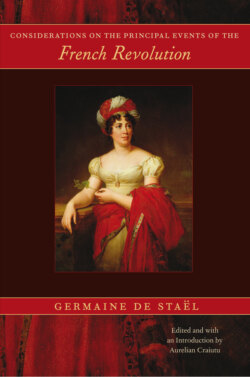Читать книгу Considerations on the Principal Events of the French Revolution - Germaine de Stael - Страница 19
На сайте Литреса книга снята с продажи.
ОглавлениеCHAPTER VII
Of the American War.
In judging of the past from our knowledge of the events that have ensued, most people will be of the opinion that Louis XVI did wrong in interfering between England and America.1 Although the independence of the United States was desired by all liberal minds, the principles of the French monarchy did not permit of encouraging what, according to these principles, must be pronounced a revolt. Besides, France had at that time no cause of complaint against England; and, to enter on a war solely on the ground of the habitual rivalship of the two countries, is bad policy in itself, and more detrimental to France than to England; for France, possessing greater natural resources, but being inferior in naval power, is sure of acquiring additional strength in peace, and as sure of being weakened by a maritime war.
The cause of America, and the parliamentary debates on that subject in England, excited the greatest interest in France. All the French officers sent to serve under Washington came home with an enthusiasm for liberty, which made it no easy task for them to resume their attendance at Versailles without wishing for something beyond the honor of being presented at court. Must we then accede to the opinion of those who attribute the Revolution to the political fault of the French government in taking part in the American war? The Revolution must be attributed to everything, and to nothing: every year of the century led toward it by every path; it was a matter of great difficulty to remain deaf to the call of Paris in favor of American independence. Already the Marquis de la Fayette,2 a French nobleman, eager for fame and liberty, had gained general approbation by proceeding to join the Americans, even before the French government had taken part with them. Resistance to the King’s will, in this matter, was encouraged by the public applause; and when the royal authority has lost ground in public opinion, the principle of a monarchical government, which places honor in obedience, is attacked at its basis.
What was then the course to be adopted by the French government? M. Necker laid before the King the strongest motives for a continuance of peace, and he who has been charged with republican sentiments declared himself hostile to a war of which the object was the independence of a people. I need not say that he, on his part, wished success to the colonists in their admirable cause; but he felt, on the one hand, that war never ought to be declared without positive necessity, and, on the other, that no possible concurrence of political results could counterbalance to France the loss she would sustain of the advantages she might derive from her capital wasted in the contest. These arguments were not successful: the King decided on the war. There were, it must be allowed, very strong motives for it, and government was exposed to great difficulties in either alternative. Already was the time approaching when we might apply to Louis XVI what Hume said of Charles I: “He found himself in a situation where faults were irreparable; a condition too rigorous to be imposed on weak human nature.”3
